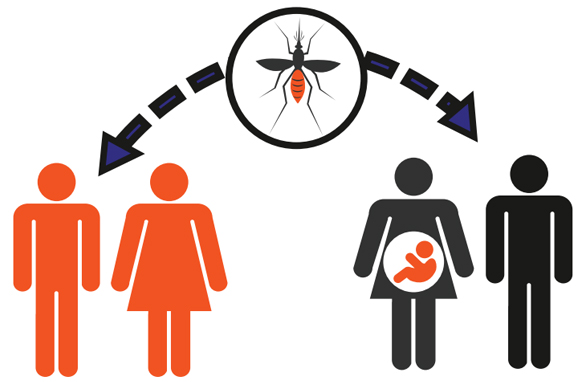Zika Virus
 Zika is a disease caused by a virus primarily transmitted through the bite of infected Aedes mosquitoes. Most people who are infected with Zika do not develop symptoms. About one in five people infected with the virus develop the disease and symptoms are generally mild. Anyone who lives or travels in the impacted areas can be infected.
Zika is a disease caused by a virus primarily transmitted through the bite of infected Aedes mosquitoes. Most people who are infected with Zika do not develop symptoms. About one in five people infected with the virus develop the disease and symptoms are generally mild. Anyone who lives or travels in the impacted areas can be infected.
Printable facts and information on Zika and mosquito control:
English (link opens in new tab) – Español (link opens in new tab) – kreyòl ayisyen (link opens in new tab)
See federal government recommendations (link opens in new tab) for any employers with employees who work outside during summer months.
The most common symptoms of Zika virus are fever, rash, joint pain, or conjunctivitis (red eyes). Symptoms typically begin two to seven days after being bitten by an infected mosquito. It can also be transmitted during sexual activity, or from a pregnant mother to her baby during pregnancy or around the time of birth. We do not know how often Zika is transmitted from mother to baby during pregnancy or around the time of birth.
In May 2015, the Pan American Health Organization (PAHO) issued an alert regarding the first confirmed Zika virus infection in Brazil. The outbreak in Brazil led to reports of Guillain-Barre syndrome and pregnant women giving birth to babies with birth defects and poor pregnancy outcomes. Zika virus infections have been documented in the Caribbean, Central and South American, and African countries.
Those who recently traveled or plan to travel to areas where Zika transmission is ongoing, including, but not limited to — Brazil, Colombia, Venezuela, Barbados, the Dominican Republic, Haiti, Puerto Rico, Costa Rica, U.S. Virgin Islands, Jamaica, Mexico, Guatemala, El Salvador, Honduras, and Panama — could be at risk. See the latest Centers for Disease Control and Prevention (CDC) list of countries (link opens in new tab).
Potential for Birth Defects
While Zika generally presents as a mild illness, there have been reports of serious birth defects to infants whose mother contracted the virus while pregnant. Microcephaly (link opens in new tab), a condition in which a baby’s head is smaller than expected when compared to babies of the same sex and age, and other poor pregnancy outcomes in babies of mothers are now linked to the virus.
